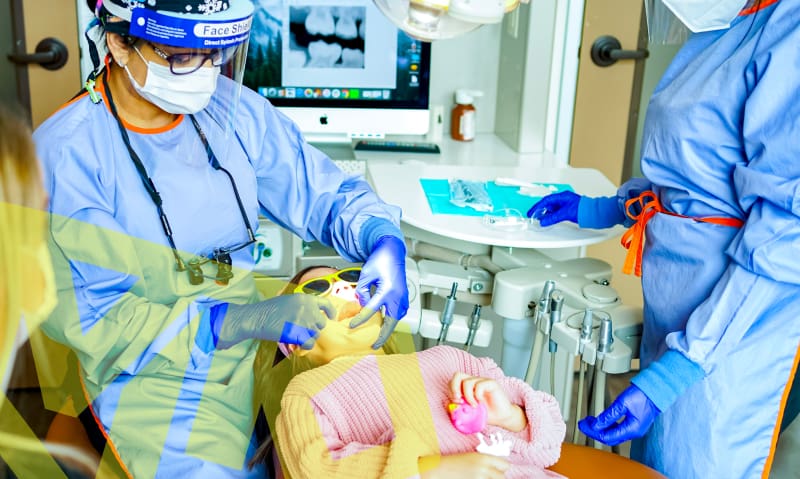5 Ways Your Dentist Boosts Your Kid’s Oral Health

Why Kids’ Oral Health Is So Important
Your kid’s oral health is far more critical than you might realize. Unfortunately, many parents mistakenly believe that oral care doesn’t need to start until children are three or four years old. Unfortunately, waiting this long to focus on a kid’s oral health can have severe consequences on your child’s future smile. Conversely, parents that teach their children about the importance of a solid oral hygiene routine early on are helping them in ways they might never have imagined.
The truth is your kid’s oral health is just as important as their overall health. This is because the mouth serves as a gateway to the rest of the body, which means that a sick mouth can lead to an unhealthy body. So, it stands to reason that a healthy mouth can help enable a healthy body, right? Right!
Poor oral health is strongly correlated with problems in school, disruptive behavior, and low self-esteem. Not only that, but poor oral health usually leads to cavities. When cavities are left untreated, they grow in size and can negatively affect the deeper layers of your child’s teeth. This can lead to a painful toothache, tooth infection, and even tooth loss. Thus, parents should consider the following 5 ways regular dental visits can help boost their kid’s oral health.
Let your dentist boost your kid’s oral health using these 5 strategies.
Face it, children’s dentistry is as much of an art as it is a science. In addition to practicing prevention, dentists also need to focus on comfort, relationship-building, and ensuring that all the amenities are there for an easy dental office visit. Today’s pediatric dentists in Vancouver, Washington, use laser dentistry and needleless numbing to make kids comfortable. Further, pediatric dentists seek to build a strong rapport between dentist, child, and parent. And finally, many modern dentists today have all the latest entertainment on-hand for kids, plus coffee, tea, and free Wi-Fi access to parents.
But aside from all of these essential aspects of “art,” science is important too.
1. Dental prevention is essential for kids’ oral health.
Dental prevention starts at home. Parents can begin teaching their children how to care for their teeth when they are still a baby. Usually, by the age of six, a child can brush their teeth twice a day with parental supervision. Parents can help their children to floss once a day. And, parents can teach their children how to rinse with a fluoridated mouthwash.
But aside from what happens at home, dental prevention in the dental office is imperative in helping to boost your kid’s oral health. Check-ups and cleanings twice a year plus sealants as soon as the child’s permanent molars come in can help keep tooth decay from forming. Your kid’s dentist may also apply topical fluoride, sometimes referred to as fluoride varnish, to further help prevent tooth decay.
2. Fillings and crowns help protect your kid’s oral health.
Sometimes, despite our best intentions, cavities happen. In this case, your pediatric dentist in Vancouver, WA, may determine that a filling or dental crown is necessary. Your children’s dentist will provide mercury-free, white, tooth-colored composite dental fillings to fill in the holes or gaps in the enamel of a broken, damaged, or decayed tooth. In addition, dental crowns may be used when a large cavity needs to be covered. And just because your child still has their baby teeth doesn’t mean that a dental filling is unnecessary. There are several reasons why dental crowns are necessary for baby teeth.
3. A frenectomy can help improve speech function.
Some children are born with a condition that is commonly referred to as a tongue tie. The lingual frenulum connects the underside of your child’s tongue with the floor of their mouth. When the lingual frenulum is too far forward on the tongue, tongue movement is often restricted. When left untreated, your child may have trouble eating and speaking properly. A frenectomy is a procedure used to correct this condition. And in many cases, the sooner the process is done, the fewer chances there will be of your child having a long-term speech impediment.
4. Mouth guards can help protect active, sports-loving children.
Most kids love to be active, and many kids love sports. But unfortunately, sports can be dangerous for teeth, especially sports like skateboarding, basketball, wrestling, soccer, and hockey. If your child is active in school or community sports, your kid’s dentist might recommend a mouth guard to help prevent injuries. Mouth guards can also help stop your child from grinding their teeth, commonly referred to as bruxism.
5. Orthodontics and early orthodontic evaluations can help boost your child’s self-confidence by ensuring a happy and healthy smile.
It’s not uncommon for children to have crooked teeth. And the best way to prevent crooked teeth is by bringing your child in for an early orthodontic evaluation at around age seven. These orthodontic evaluations are vital to your kid’s oral health because they can pinpoint a high palate, prevent sleep problems, help kids who are struggling in school, and reduce the need for future treatments. In addition, if your kid’s dentist determines that braces are needed, then these orthodontic devices can help straighten your child’s teeth, leaving them with a happier and healthier smile.
The Must Love Kids team is ready to help boost your kid’s oral health.
The Must Love Kids team is ready to meet you and your child. Be sure to request an appointment using our convenient online form. We’ll be in touch with you to schedule an appointment to discuss how we can help boost your kid’s oral health.